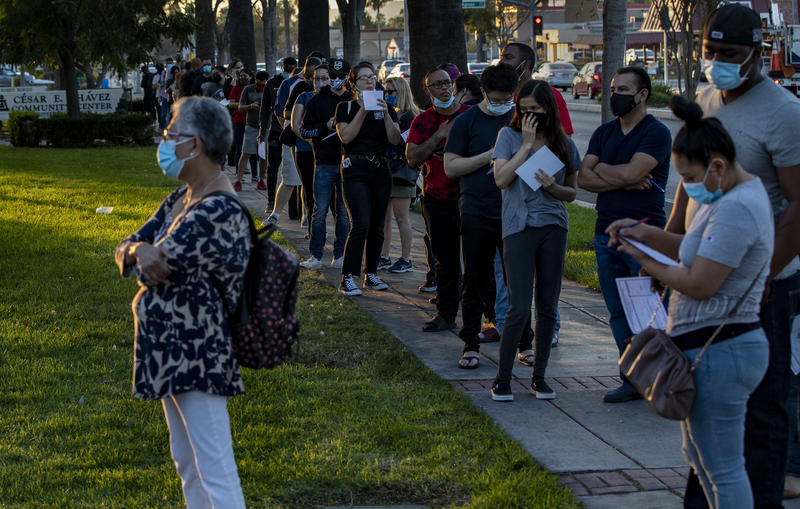
Black teachers: How to recruit them and make them stay

Lessons in higher education: What California can learn

Keeping California public university options open

Superintendents: Well-paid and walking away

The debt to degree connection

College in prison: How earning a degree can lead to a new life

For the second time in a quarter century Californians appear to have overwhelmingly rejected affirmative action.
Unofficial returns show voters on Tuesday defeating Proposition 16, which would have allowed California’s public agencies, universities and community colleges to consider race, gender and ethnicity when making decisions on contracting, hiring and student admissions. Prop. 16 was designed to overturn Prop. 209, which banned affirmative action in 1996.
With 100% of the precinct votes counted, 56.1% of votes cast are against the measure, while nearly 44% of votes are in favor, but at least several million mail-in, provisional and same-day registration ballots were still being counted. There were 6.4 million votes rejecting the measure and 5 million approving it, according to unofficial results.
The largest share of yes votes – more than 2 million – were cast in the Los Angeles and several Bay Area counties while voters in nearly all of the other counties across the state appear to be rejecting the measure. (Go here for the latest results on Propositions 15, 16 and 18.)
Prop. 16 called for the language of 1996’s Proposition 209, which banned affirmative action in California, to be removed from the state’s constitution. In 1996, Prop. 209 which banned affirmative action won by 10 points – 54.5% in favor and 45.5% opposed. If the vote opposing Prop. 16 holds, it will mean that voters’ opinion on affirmative action remains virtually unchanged.
The measure would have allowed California’s public agencies, universities and community colleges to consider race, gender and ethnicity when making decisions on contracts, hiring and student admissions.
“We have successfully defeated a far-left measure in America’s bluest state,” Wenyuan Wu, executive director of Californians for Equal Rights, and head of the No on 16 campaign, said in a statement issued early Wednesday. “We won and the principle of equality has prevailed again, against a powerful opponent backed by the political establishment, corporate billionaires, and special interest groups.”
Prop. 16 attracted $19 million in cash through seven campaign committees and support from the state’s Democratic establishment, but didn’t appear to catch on with the public. Assemblymember Shirley Weber, D-San Diego, led the legislative initiative to put Prop. 16 on the ballot.
Typically, propositions get to California voters through the collecting of thousands of signatures in support. Some political observers say how the proposition got to the ballot explains why the Yes on 16 campaign trailed in two statewide September polls.
Opponents cast Prop. 16 as violating the civil rights of qualified students not admitted to the University of California and California State University to make room for underrepresented students — Blacks, Latinos and Native Americans.
Prop. 16 brought former UC regent Ward Connerly, the father of Prop. 209, back to California from his home in Idaho to help fight off the challenge.
In an interview with EdSource last month, Connerly, who is black, said he believes there is no systemic racism in America, and that Prop. 16 was an attempt to seize power in California. He predicted whites would flee the state if affirmative action returns.
Supporters of Prop. 16 said affirmative action would allow the state’s public universities to recruit and support underrepresented students with targeted scholarships and programs and seek candidates to increase faculty diversity.
An EdSource analysis of student enrollment data over the last 24 years shows that the affirmative action ban had a huge impact on California’s public universities with gaps between underrepresented students enrolled and high school graduates and those qualified for admission.
Proponents, led by Weber, called removing the language of Prop. 209 critical to advancing civil rights for Blacks, Latinos and Native Americans.
“California is known for being the best,” she said after the state legislature voted to put Prop. 16 on the ballot. “Now is the time to step up and make that a reality.”

Part-time instructors, many who work for decades off the tenure track and at a lower pay rate, have been called “apprentices to nowhere.”

A bill to mandate use of the method will not advance in the Legislature this year in the face of teachers union opposition.

Nearly a third of the 930 districts statewide that reported data had a higher rate of chronic absenteeism in 2022-23 than the year before.

The move puts the fate of AB 2222 in question, but supporters insist that there is room to negotiate changes that can help tackle the state’s literacy crisis.
Comments (3)
Comments Policy
We welcome your comments. All comments are moderated for civility, relevance and other considerations. Click here for EdSource's Comments Policy.
Yaya 3 years ago3 years ago
I’d love to see more Asian Americans vote against the Democratic Party. All of the Democratic Party’s policies explicitly work against them, from affirmative action to fiscal/monetary policy. I’m not sure why this isn’t a widely held view by most Asian Americans…
Ben GayAvila 3 years ago3 years ago
Let’s put a statue of the Great Ward Connerly on every campus of the UC System! Bravo Sir! With all respect and admiration.
Jim 3 years ago3 years ago
The concerted effort by the Democratic Party to alienate Asians is curious. They know this was targeted at them and the lack of any projection of what the effect would be was confirmation of deceptive intent.